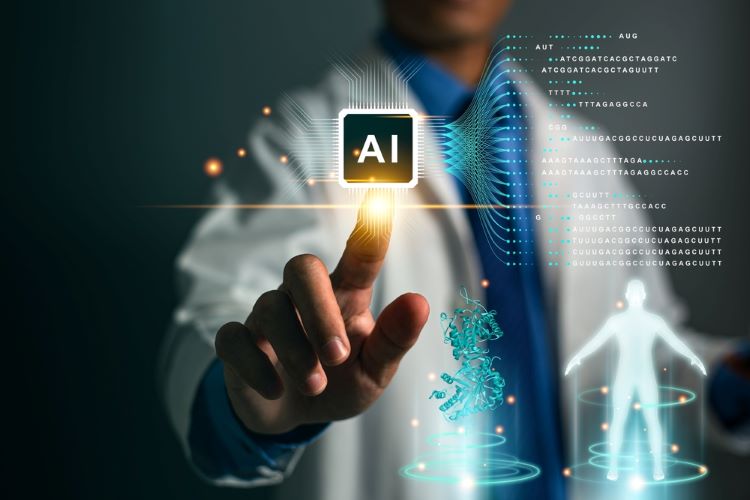GenAI in pharma: where are we today?
Posted: 12 January 2024 | Caroline Peachey (European Pharmaceutical Review) | No comments yet
EPR speaks to Henry Levy, President, Life Sciences at Clarivate to gain a sense of how artificial intelligence (AI), and particularly Generative AI (GenAI), is transforming the pharmaceutical industry.


A recent survey from the Pistoia Alliance revealed that AI and machine learning (ML) will be the top technology investment for 60 percent of life sciences companies over the next two years.1
AI and machine learning (ML) will be the top technology investment for 60 percent of life sciences companies over the next two years”
With this increased focus on AI/ML, EPR editor Caroline Peachey sat down with Henry Levy, President of Life Sciences at Clarivate, to discuss the status, challenges and use cases for AI/ML in the pharmaceutical industry.
Levy is a leading life sciences expert who has published multiple articles on drug development and technology trends. Prior to joining Clarivate, Levy held several roles in the pharmaceutical industry, including at Veeva Systems, Pharmaceutical Product Development (PPD) and Accenture.
Use of artificial intelligence (AI) and machine learning (ML) in pharma
“AI/ML is in most technologies, and in most pharmaceutical companies,” Levy explains.
From the outset he is sure to distinguish between ‘conventional’ artificial intelligence/machine learning, which has been around for seven to 10 years, and generative AI. With the emergence of ChatGPT, GenAI has rapidly gained prominence in the last 12 months and is increasingly being recognised for its potential to accelerate and enhance drug discovery.
Generative AI changes the dynamic in two ways: by escalating the level of automation possible and increasing the potential for innovation”
Generative AI changes the dynamic in two ways: by escalating the level of automation possible and increasing the potential for innovation.
In the regulatory space, Levy explains that AI/ML is already used to pre-populate submissions to the authorities, for example, by pre-filling set fields. GenAI could take this to another level with the ability to generate “probably 95 percent” of that content. With proper oversight, GenAI has potential to drive efficiencies and cut the time needed for a regulatory submission, Levy says.
There is also scope for innovating new drugs, but that is further off, according to Levy.
“I think in five to 10 years, the intelligence level will get to a point where GenAI can actually contribute to actual innovation in the development of drugs,” Levy reflects. “Even though a lot of companies are trying to apply AI or GenAI to potentially designing and adjusting a molecule, I do not think GenAI does the work, but it can help accelerate it.”
Overcoming key AI challenges: regulation, cost and beyond
Regulatory acceptance is a ‘core challenge,’ of implementing AI in the pharmaceutical environment. Regulators are working on defining regulations and guidelines for AI usage while also exploring AI applications internally. From a regulatory perspective, Levy says that none of the authorities have answered fundamental questions related to submission of a filing containing AI eg, What type of testing needs to be done? What type of evidence needs to be in the filing? These are all questions to answer, he says.
Regulatory acceptance is a ‘core challenge,’ of implementing AI in the pharmaceutical environment”
Another barrier to AI is – unsurprisingly – cost.
“GenAI sounds awesome… but if you want to have something that works in this specific space, the costs today are high,” Levy notes. However, as with any technology these cost barriers should subside over time.
Hallucinations – the generation of outputs that may sound plausible but are either factually incorrect or unrelated to the given context – is an additional factor to consider. However, Levy believes that this is more of a fear than a reality for the pharma industry.
“In the pharmaceutical industry, the way that we will do things, those hallucinations should be significantly minimised,” Levy explains.
“Nobody in the pharmaceutical industry is saying that they want to [use AI] independent of humans. They are not going to take the outcome of an AI algorithm and put that into a patient.
“So, I feel that it is more fear than reality. But there are some realities [of hallucinations], and you must deal with that.”
Use cases for GenAI in pharma
Although there could be ‘infinite’ applications for AI in pharma, the most important ones are in research and discovery space “where the math is about getting rid of hundreds of 1000s of options down to the five to 10 that you want to put into a human,” Levy says.
“If you can take that process and significantly shorten it by, in essence, predicting and designing a molecule that has a higher percentage of success, that would be transformational.”
However, Levy stresses that the results will not be known until “maybe four to six years” from now.
GenAI could help in the design of more effective clinical trials, as well as for identifying patients by looking at real world data… Patient recruitment is the hardest part of the process, so if you can accelerate that it would be amazing”
GenAI could help in the design of more effective clinical trials, as well as for identifying patients by looking at real world data. “Patient recruitment is the hardest part of the process, so if you can accelerate that it would be amazing,” Levy says.
Looking at focus areas for AI, Levy continues: “I think the next three to five years is about efficiency and a little bit of speed. I think five to 10 years from now, it has the potential to be innovation – and once you get there, wow!”
AI applications
There are many activities that are done that are not generative in nature. Conventional AI/ML, depending on the activity, can be used for automation.
Levy gives the example of clinical data management whereby physicians enter information about a clinical trial. In these cases, AI can be used to identify mistakes/discrepancies in data and notify the physician. Using AI and ML to create some simple algorithms can help in automating the process to connect clinical trial data.
Looking to the future
“For the first time in a long time, the pharmaceutical industry is actually taking adoption of an IT innovation incredibly seriously,” Levy asserts. “I do not think they are that far. Of course, it is a big industry and there are laggards and leaders.”
All the pharma companies Levy’s working with are investing deeply in AI and pushing their organisations and partners to be as aggressive as possible. One sector that is not as advanced is perhaps biotech, as these organisations tend to be risk averse on the long term to ensure the short term, he says.
Summarising his views, which he calls ‘optimistic’ Levy says: “I want to repeat the fact that AI is not a replacement for humans, for scientists or for science.”
“The human body has not been able to be mapped to the level that you know exactly what it is going to do… Therefore, I do not think that GenAI will cure cancer. But it might accelerate some cures in some areas of cancer because the human body will evolve [and] will adjust.”
He concludes: “I am excited, I think the industry is excited and I think we should all be very serious about AI. But science is still going to be incredibly necessary and valuable, and scientists are going to be credited.”
About the interviewee
Henry Levy is the President of Life Sciences at Clarivate. He has over 25 years of experience in life sciences. Prior to Clarivate, Henry held several roles at Veeva Systems, including Chief Strategy Officer, General Manager for the Clinical Data Management product suite and, most recently, President, Global R&D and Quality.
Previously, he was Chief Commercial Officer for Pharmaceutical Product Development (PPD), where he defined new models for biopharmaceutical companies to partner with contract research organisations (CROs) to drive down costs and improve the speed of drug development. Before that, he led Accenture’s global life sciences R&D practice.
References
- A global survey compiled in partnership with lab of the future congress. [Internet]. Pistoia Alliance. 2023. [cited 2024Jan]. Available from: https://www.pistoiaalliance.org/lab-of-the-future-report-2023/
Related topics
Artificial Intelligence, Big Data, Big Pharma, Biopharmaceuticals, Clinical Development, Data Analysis, Drug Development, Industry Insight, investment, Regulation & Legislation, Research & Development (R&D), Technology, Therapeutics









